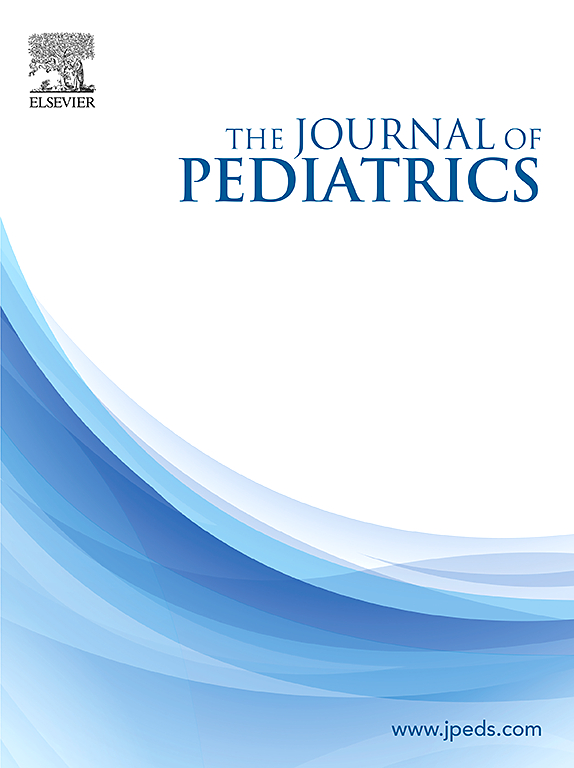产前接触和未接触酒精的发育正常儿童的临床特征。
IF 3.9
2区 医学
Q1 PEDIATRICS
引用次数: 0
摘要
目的:确定产前酒精暴露(PAE)是否会影响发育明显正常的一年级儿童的身体和认知/行为结果:确定产前酒精暴露(PAE)是否会影响发育明显正常的一年级儿童的身体和认知/行为结果:研究设计:对三组儿童进行比较:患有胎儿酒精谱系障碍(FASD)的儿童;患有 PAE 但未患有 FASD 的儿童;以及未患有 PAE 的儿童:结果:三组儿童在大多数身体特征和较少的神经发育特征上存在明显差异。暴露组和未暴露组、非 FASD 组的两组比较在以下方面存在统计学差异:身高、体重、头围 (OFC)、体重指数 (BMI) 和睑裂长度 (PFL)。神经行为结果在三组比较中具有显著性,但在两组比较中不具有显著性。几乎没有观察到性别差异;但是,性别比例表明,在怀孕期间每次饮酒量超过 6 杯的女性中,一年级的男性后代较少。就体重、OFC、BMI、年龄、农村居住地和饮酒量而言,无 FASD 暴露儿童的母亲介于其他母亲组之间,并与其他母亲组有显著差异。经社会经济协变量、多变量协方差分析(MANCOVA)调整后,认知/行为变量的三组比较差异显著(P.05)。非 FASD 群体的身体特征 MANCOVA 比较仅在体重方面有显著差异(p 结论:即使在符合发育标准的情况下,PAE 儿童的生长和认知/行为特征也比非 PAE 儿童表现出更差的趋势。这些发现支持了孕期禁欲是最佳选择的观点。本文章由计算机程序翻译,如有差异,请以英文原文为准。
Clinical Features of Typically Developing Children with and without Prenatal Alcohol Exposure
Objective
To determine if prenatal alcohol exposure (PAE) affected physical and cognitive/behavioral outcomes in apparently typically developing, first-grade children.
Study design
Three groups were compared: children with fetal alcohol spectrum disorders (FASD), children with PAE without FASD, and children without PAE.
Results
The 3 groups were significantly different on most physical traits and fewer neurodevelopmental traits. Two-group comparisons of exposed and unexposed, non-FASD groups were statistically different on: height, weight, body mass index (BMI), and palpebral fissure length. Neurobehavioral outcomes were significant in three-group, but not 2-group comparisons. Few sex differences were observed; however, sex ratios indicated fewer male offspring in first grade among women who consumed 6+ drinks per occasion during pregnancy. For weight, head circumference (OFC), BMI, rural residence, and drinking measures, mothers of exposed children without FASD were intermediaries between, and significantly different from, the other maternal groups. Adjusted for socioeconomic covariates, multivariate ANCOVA, three-group comparisons of the children were significantly different for cognitive/behavioral variables (P < .001); however, 2-group neurobehavior comparisons for children without FASD were not significant (P ≥ .05). Physical trait multivariate ANCOVA comparisons of the non-FASD groups were significant only for weight (P < .004) when tested univariately and through stepdown analysis. Socioeconomic-adjusted trend plots were in the expected direction for nonverbal IQ, attention, height, weight, OFC, palpebral fissure length, and total dysmorphology score.
Conclusions
Even when meeting developmental norms, children with PAE exhibited trends of poorer growth and cognitive/behavioral traits than children without PAE. These findings support the notion that abstinence during pregnancy is best.
求助全文
通过发布文献求助,成功后即可免费获取论文全文。
去求助
来源期刊

Journal of Pediatrics
医学-小儿科
CiteScore
6.00
自引率
2.00%
发文量
696
审稿时长
31 days
期刊介绍:
The Journal of Pediatrics is an international peer-reviewed journal that advances pediatric research and serves as a practical guide for pediatricians who manage health and diagnose and treat disorders in infants, children, and adolescents. The Journal publishes original work based on standards of excellence and expert review. The Journal seeks to publish high quality original articles that are immediately applicable to practice (basic science, translational research, evidence-based medicine), brief clinical and laboratory case reports, medical progress, expert commentary, grand rounds, insightful editorials, “classic” physical examinations, and novel insights into clinical and academic pediatric medicine related to every aspect of child health. Published monthly since 1932, The Journal of Pediatrics continues to promote the latest developments in pediatric medicine, child health, policy, and advocacy.
Topics covered in The Journal of Pediatrics include, but are not limited to:
General Pediatrics
Pediatric Subspecialties
Adolescent Medicine
Allergy and Immunology
Cardiology
Critical Care Medicine
Developmental-Behavioral Medicine
Endocrinology
Gastroenterology
Hematology-Oncology
Infectious Diseases
Neonatal-Perinatal Medicine
Nephrology
Neurology
Emergency Medicine
Pulmonology
Rheumatology
Genetics
Ethics
Health Service Research
Pediatric Hospitalist Medicine.
 求助内容:
求助内容: 应助结果提醒方式:
应助结果提醒方式:


